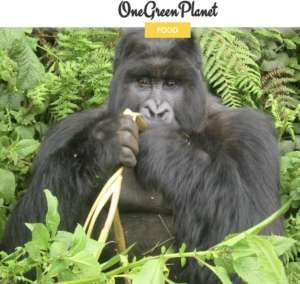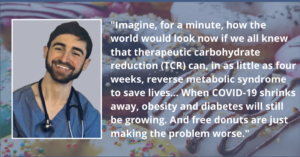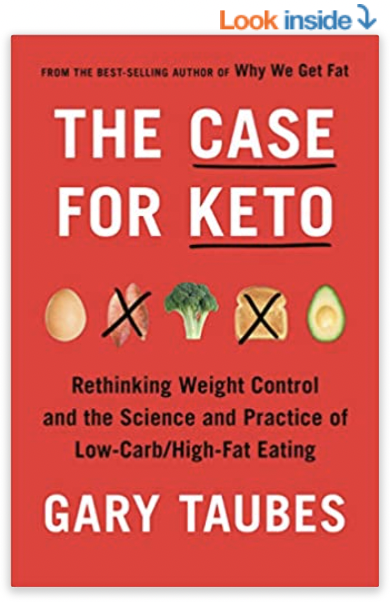Green Energy Inside and Out
Energy powers the American economy, from transportation to textiles, agriculture, and manufacturing, to information technologies, communications, even rocket launches. Lots of matter and electrons pushed one way and another making and moving the everyday goods and services we often take for granted in modern economies.
Critics of today’s energy choices want everything switched over from fossil fuels to wind, solar, and biofuels, to energy sources referred to as sustainable and renewable.

Okay, that’s the outside energy. But many of the same people are pushing green energy inside as well as out. They want nutrition switched over to greens, beans, whole grains, legumes, and nuts. They want people to stop eating fossil fuel and water intense, beef, pork, chicken, and fish.
The planet, they say, will run better, cleaner, and longer on green energy, and, they say, so will our bodies when powered by vegetarian and vegan. If powerful gorillas can thrive on greens, why can’t we?
Well, it turns out there are a number of challenges both with green energy for the outside world (see nearly all Economic Thinking energy posts and MasterResource posts, including mine), and for green energy inside.
Going green inside can make you crazy, see: Dr. Georgia Ede – ‘Our Descent into Madness: Modern Diets and the Global Mental Health Crisis’. And green energy inside and “Meatless Monday” won’t save the planet (or our sanity). For details, see Georgia Ede’s article EAT-Lancet’s Plant-Based Planet: 10 Things You Need to Know (Psychology Today, January 19, 2019):
…this 47-page document envisions a “Great Food Transformation” which seeks to achieve an environmentally sustainable and optimally healthy diet for the world’s people by 2050. Its core recommendation is to minimize consumption of animal foods as much as possible, and replace them with whole grains, legumes, and nuts.
And the video version on YouTube: Dr. Georgia Ede – ‘EAT-Lancet’s Plant-Based Planet: Food in the (Mis)Anthropocene’
On the healthy human power of red meat see Nina Teicholz – ‘Science and Politics of Red Meat in 2021’ (posted on April 24 and by April 26 already with nearly 30,000 views).
The lack of scientific evidence in support the federal government’s past low-fat dietary guidelines is the subject of: Nina Teicholz – ‘Dietary Guidelines & Scientific Evidence’ (May 9, 2009). And her 2015 book, The Big Fat Surprise.
For more background and sources, see Many past Economic Thinking posts on nutrition and public health.
Misguided federal nutrition policies and the processed food industry that responded to the call for low-fat foods played the major role in shifting Americans away from the healthy fats and protein in meat, eggs, and dairy. Lots of small meals and snacks through the day (recommended by mainstream nutritionists) provide a kind of “intermittent energy” from processed carbs, sugar, and industrial seed oil (PUFAs). Many or most Americans are overweight, pre-diabetic or diabetic, and thereby predisposed for severe or critical Covid.
Nina Teicholz explains in A Low-Carb Strategy for Fighting the Pandemic’s Toll (WSJ, May 30, 2020):
The coronavirus has added a brutal exclamation point to America’s pervasive ill health. Americans with obesity, diabetes, heart disease and other diet-related diseases are about three times more likely to suffer worsened outcomes from Covid-19, including death. Had we flattened the still-rising curves of these conditions, it’s quite possible that our fight against the virus would today look very different.

Nicholas Norwitz cites further research in When COVID-19 Shrinks Away, Our Obesity and Diabetes Epidemic Will Still be Growing (Society of Metabolic Health Practitioners, April 20, 2021):
As examples, diabetes and obesity unequivocally increase COVID-19 severity, including a two-fold increase in mortality (Cefalu and Rodgers, 2021). One study noted that, if you’re diabetic, you have a 10% chance of dying within seven days of being hospitalized with COVID-19 (Cariou et al, 2021). Another observed that 31.4% of COVID-19 related deaths occur in people with type 2 diabetes (Barron et al. 2020).
So, how many lives have metabolic diseases contributed to the COVID-19 death toll (of 563,000 lives) this past year? Given that more than one third of Americans have diabetes or pre-diabetes, 42.4% are obese, and 88% have at least one marker of metabolic syndrome (Araujo et al. 2019), the number is not one I’m keen to quantify.
Billionaires and their Wives Against Meat
It’s not that everyone one needs to eat meat to be healthy. Instead it is that protein and healthy fats are key to health and the decades of claims that saturated fats and cholesterol cause heart disease were just theories. Billions of dollars of government research funding couldn’t secure confirming RCPs (Randomized Control Trials).
EAT-Lancet Report is One-sided, Not Backed by Rigorous Science (Nutrition Coalition, January 29, 2019):
This report is disturbing on a number of fronts. Most importantly, its diet lacks the backing of any rigorous science. Indeed, it does not cite a single clinical trial to support the idea that a vegan/vegetarian diet promotes good health or fights disease. Instead EAT-Lancet relies entirely on a type of science that is weak and demonstrably unreliable, called epidemiology. This kind of science has been shown to be accurate, when tested in rigorous clinical trials, only 0-20% of the time.[1][2] One wouldn’t bet on a football team with such poor odds, so why bet on the public health this way?
Further problems:
EAT-Lancet Report is One-sided, Not Backed by Rigorous Science (Nutrition Coalition, January 29, 2019)
The EAT-Lancet commission was portrayed as the product of 37 scientists from around the world. However, in reality, the authors represented a very narrow range of opinions: 31 out of the 37 (>80%) had established published records as being in favor of vegetarian/vegan or anti-meat diets. This include seven from a Stockholm think tank (and EAT co-founder) dedicated to reducing/eliminating meat for environmental reasons. Thus, although readers are given the impression that the EAT authors have been objectively convened to comprehensively evaluate the science, the reality is that this group was one-sided from the start. Instead of grappling with the very real scientific controversies that exist on these topics, the group considered virtually none of the science that contradicts their views.

So, let’s find and follow strong scientific research to inform our views on nutrition, on “what we should eat and why” (quote from Gary Taubes’ The Case for Keto: Rethinking Weight Control and the Science and Practice of Low-Carb/High-Fat Eating).
Let’s research the science on both internal and external energy, on how best to power our cars, homes, and factories as well as out bodies. Lets be skeptical and science-based not only in researching red meat and yellow egg yokes, but also of greens, beans, fruits, and grains.
